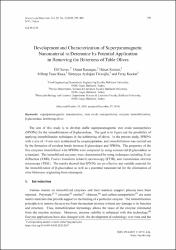Development and characterization of superparamagnetic nanomaterial to determine its potential application in removing the bitterness of table olives

View/
Access
info:eu-repo/semantics/openAccessDate
2020Author
Savaş, ElifKaraağaç, Öznur
Köçkar, Hakan
Kaya, Mihrap Yaşar
Türkoğlu, Sümeyye Aydoğan
Köçkar, Feray
Metadata
Show full item recordAbstract
The aim of this study is to develop stable superparamagnetic iron oxide nanoparticles (SPIONs) for the immobilization of beta-glucosidase. The goal is to figure out the possibility of applying immobilization techniques in the debittering of olives. In the present study, SPIONs with a size of similar to 9 nm were synthesized by co-precipitation, and immobilization was carried out by the formation of covalent bonds between beta-glucosidase and SPIONs. The properties of the free enzymes immobilized with SPIONs were compared by using commercial beta-glucosidase as a standard. The immobilized enzymes were characterized by using techniques including X-ray diffraction (XRD), Fourier transform infrared spectroscopy (FTIR), and transmission electron microscopy (TEM). The results showed that SPIONs are an effective and suitable material for the immobilization of beta-glucosidase as well as a potential nanomaterial for the elimination of olive bitterness originating from oleuropein.

















